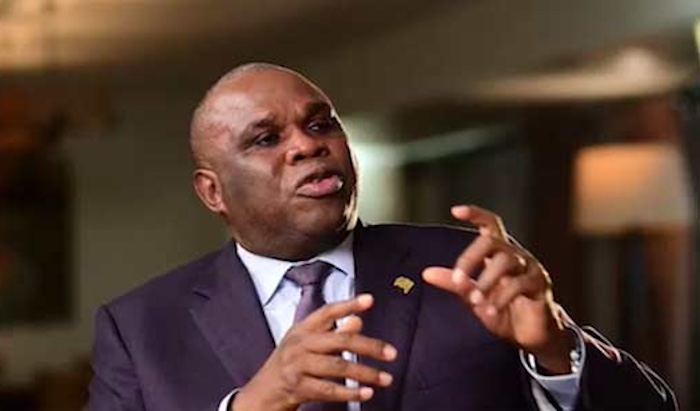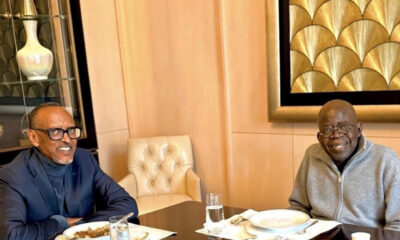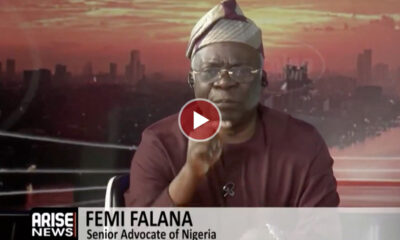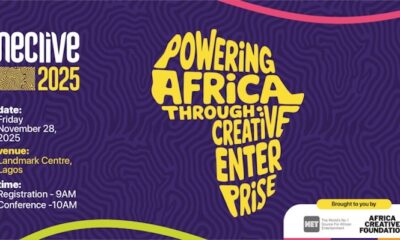Business
African Leaders Urged to Embrace Innovation Amid Deglobalisation

Professor Benedict Okey Oramah, the immediate past President and Chief Executive of the African Export and Import Bank (Afreximbank), delivered a powerful call to action for African leaders during his address at the Nigeria-British Chamber of Commerce (NBCC) “2025 Presidential Inauguration Dinner” in Lagos on March 11, 2024. Oramah urged leaders across the continent to act boldly and innovatively to counter the challenges posed by current trends of deglobalisation, which he believes threaten Africa’s developmental potential.
Speaking on the theme “Stewarding the Future: Leadership, Trade and Transformation,” Oramah questioned why global frameworks, which have previously facilitated development in other regions, are being abandoned just as Africa is poised for growth. He emphasized that responsible leadership should proactively address this situation. “True leadership that envisions and acts with courage and innovation should attempt to convert every challenge into an opportunity,” he stated.
Oramah’s remarks highlighted the necessity for African leadership to move beyond a mindset of privilege and embrace the responsibilities that come with leadership. “Taking one’s destiny in one’s hands is leadership in action. Refusing to succumb to a victim mentality… is leadership in action,” he explained. He lamented that a delay of 60 years in implementing decisions from the first general assembly of the then Organisation of African Unity in 1963 regarding intra-African trade has cost the continent dearly in terms of missed opportunities.
He expressed optimism about Africa’s future, asserting, “With or without globalisation, Africa’s trade-driven transformation is on its way.”
Insights from Nigerian Leaders
The event also featured remarks from former Lagos State Governor Babatunde Fashola (SAN), who underscored the importance of mindset in unlocking Africa’s trading capacity. He noted that trade and diplomacy are essential tools for development and encouraged nations to use these tools wisely, especially in a time when tariffs heavily influence international trade.
Fashola cautioned that issues related to law and order could threaten productivity and investment, stating, “There is work to be done in the area of law and order, which is a cloud that can threaten these brightly shining stars.” His comments reflect a growing concern among leaders regarding the internal challenges that can impede trade and development.
In his acceptance speech, Mr. Abimbola Olashore, the newly inaugurated 19th President and Chairman of Council of the NBCC, expressed gratitude and a sense of responsibility towards strengthening Nigeria-UK trade relations. He emphasized that the dinner was not merely an inauguration but a reaffirmation of commitment to fostering trade and navigating the complexities of the global economic landscape.
As Olashore reflected on the realities of the current economic climate, he stated, “I am even more convinced that the NBCC is uniquely positioned to lead, to influence, and to drive meaningful impact.”
The discussions at the NBCC dinner highlight a critical juncture for African leadership, as the continent navigates the complexities of a changing global trade environment while seeking to capitalize on its unique opportunities for growth and development.
-

 World1 month ago
World1 month agoCoronation Street’s Shocking Murder Twist Reveals Family Secrets
-

 Entertainment1 month ago
Entertainment1 month agoAndrew Pierce Confirms Departure from ITV’s Good Morning Britain
-

 Entertainment5 months ago
Entertainment5 months agoKate Garraway Sells £2 Million Home Amid Financial Struggles
-

 Entertainment4 months ago
Entertainment4 months agoAnn Ming Reflects on ITV’s ‘I Fought the Law’ Drama
-

 World2 months ago
World2 months agoBailey Announces Heartbreaking Split from Rebecca After Reunion
-

 Entertainment1 month ago
Entertainment1 month agoDavid Jason and Nicholas Lyndhurst Eye Reunion for Only Fools Anniversary
-

 Entertainment2 months ago
Entertainment2 months agoCoronation Street Fans React as Todd Faces Heartbreaking Choice
-

 Health4 months ago
Health4 months agoKatie Price Faces New Health Concerns After Cancer Symptoms Resurface
-

 Entertainment1 month ago
Entertainment1 month agoBradley Walsh Sparks Strictly Come Dancing Hosting Speculation
-

 Entertainment1 month ago
Entertainment1 month agoTwo Stars Evicted from I’m A Celebrity Just Days Before Finale
-

 Entertainment4 months ago
Entertainment4 months agoCoronation Street’s Carl Webster Faces Trouble with New Affairs
-

 World1 month ago
World1 month agoKevin Sinfield Exceeds Fundraising Goal Ahead of Final Marathons





















